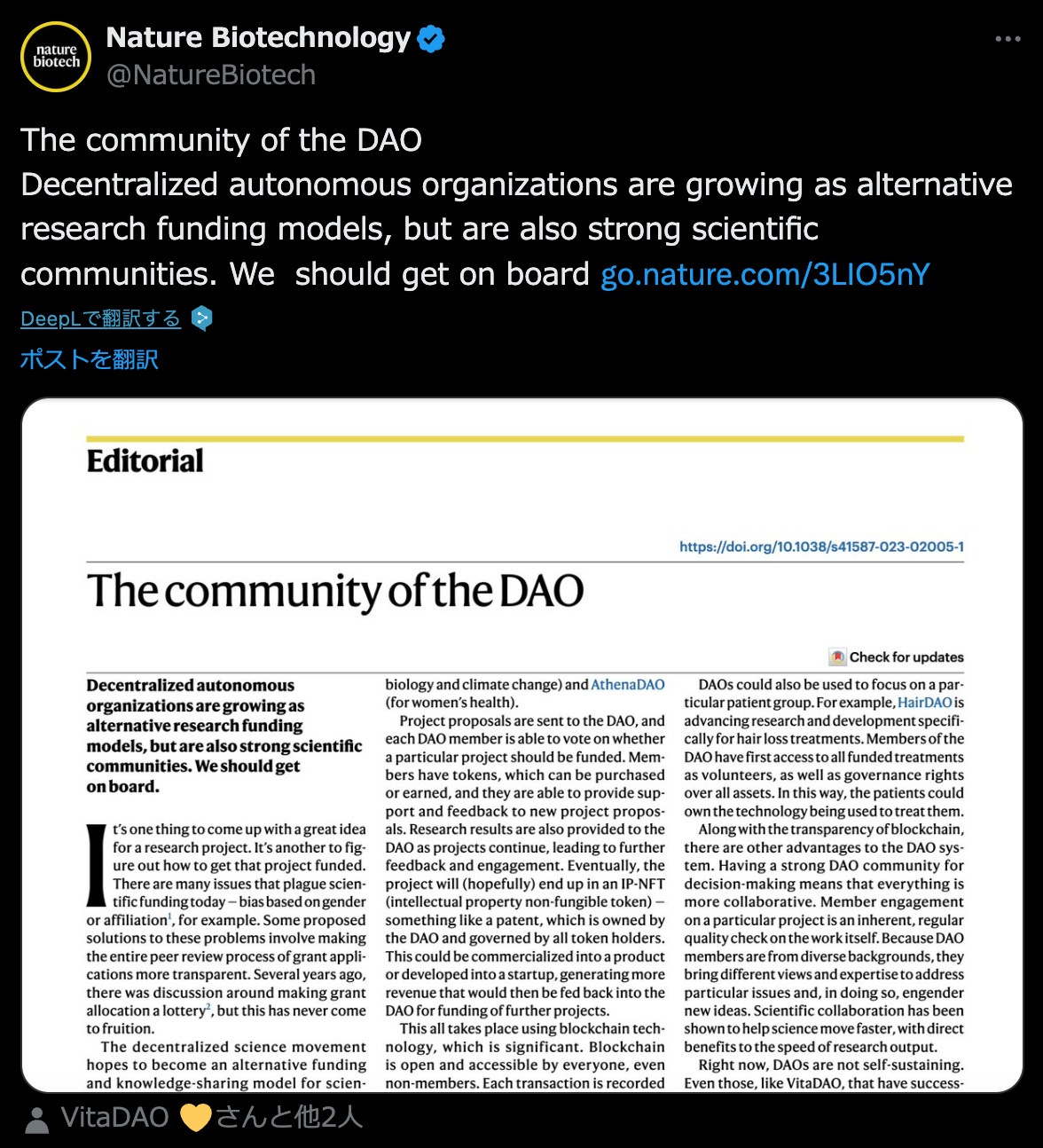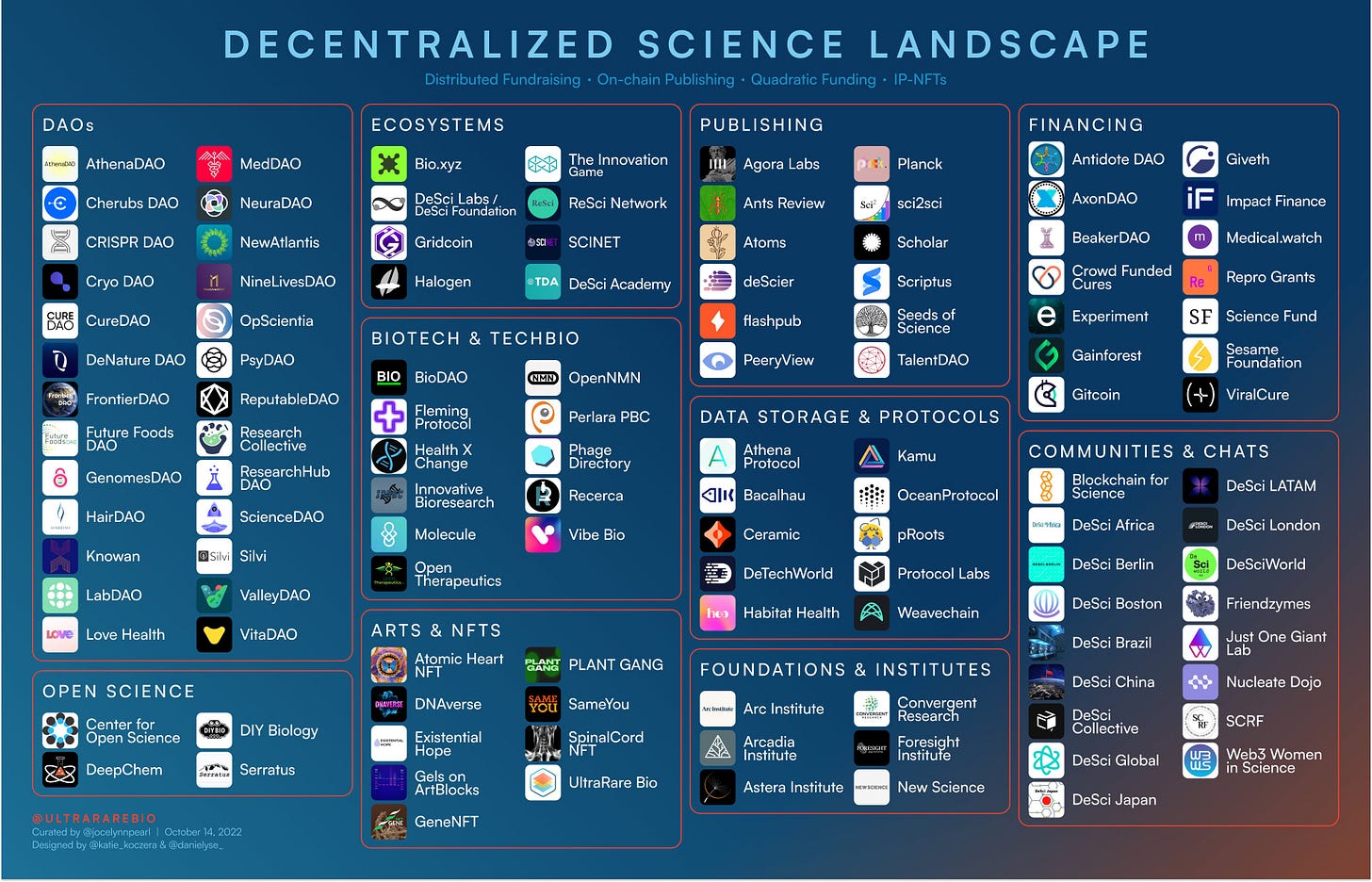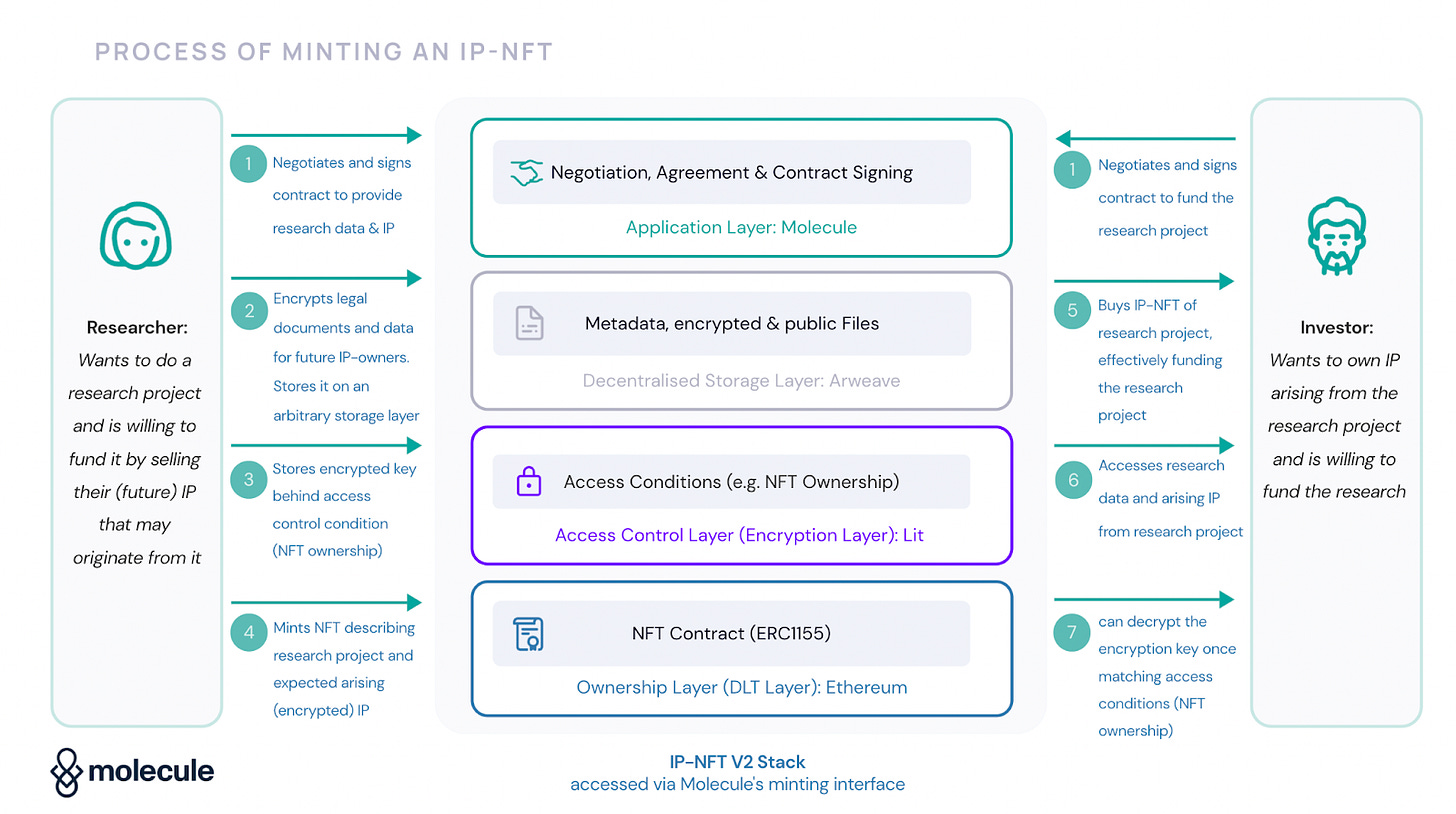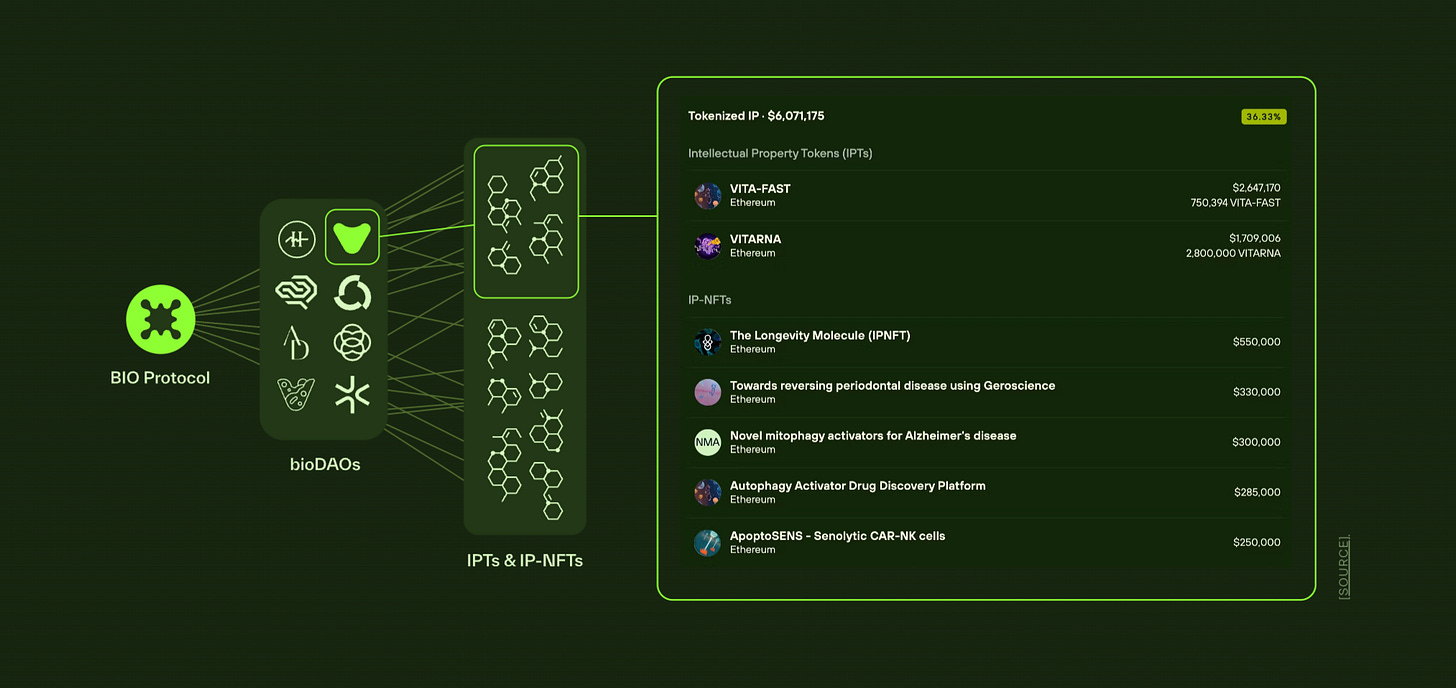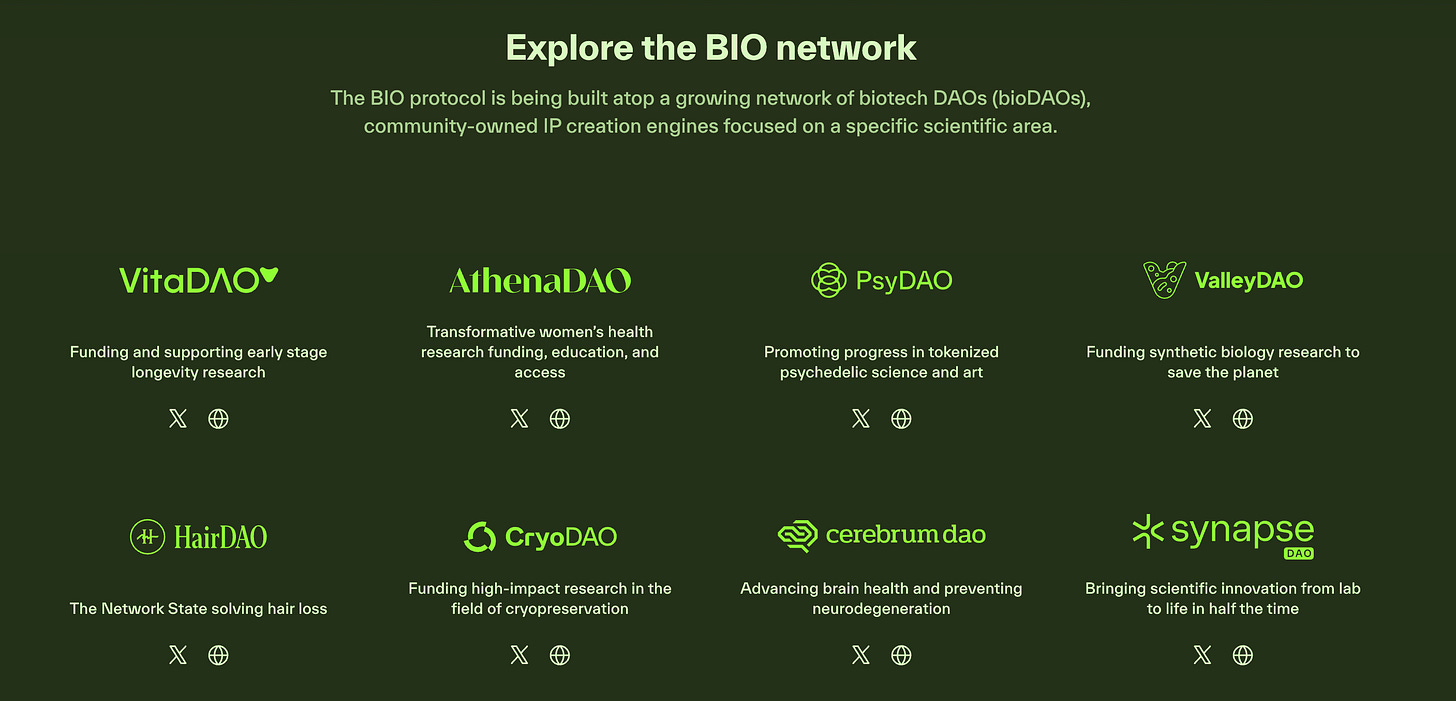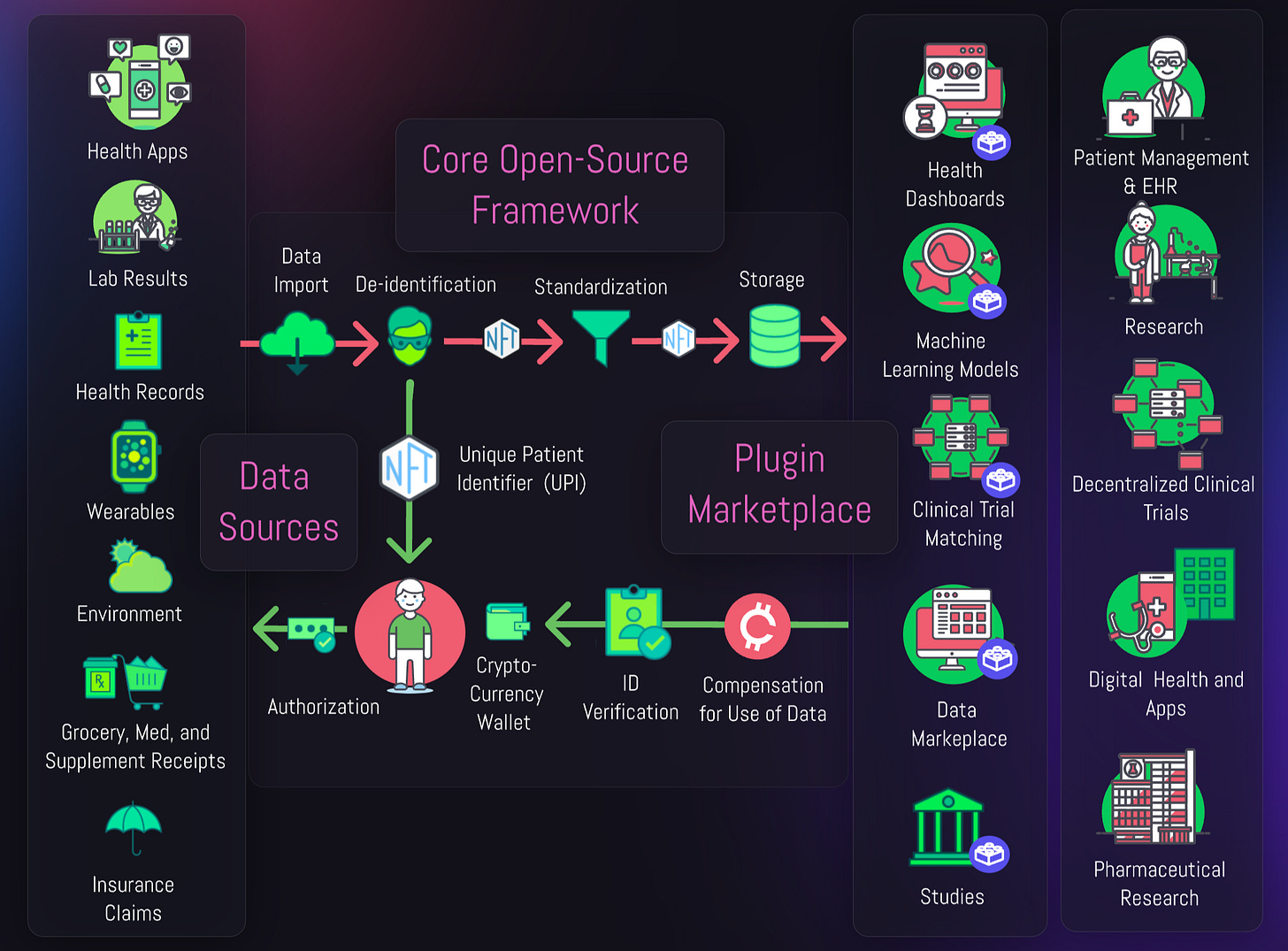【DeSci Market Report】Definition, Background, Market Size, Representative Projects, Challenges and Outlook
Understand DeSci from the ground up.
Good morning.
Mitsui from web3 researcher.
Today's "DeSci Market Report" is a deep dive into DeSci.You may not have heard of it, but it is a field that is slowly gaining momentum, so please take this opportunity to read about it!
💊DeSci definition and background
🌊DeSci market size and representative projects
💬DeSci challenges and prospects discussed
💊Definition and background of DeSci
Let's start with an overview of "DeSci.
DeSci" stands for "Decentralized Science" and uses blockchain to solve problems in the scientific field.
The following serious problems exist in the field of scientific research.(I am not an expert either, so this is just a summary based on my research.)
Uneven distribution of research funding: Funding tends to be concentrated in large research institutions and prominent researchers.This can result in up-and-coming researchers and projects that are considered innovative but "high risk" not receiving sufficient funding.As a result, the diversity and creativity of science may be limited.
Publication Bias: Journals generally tend to favor positive results and breakthrough findings.As a result, negative results or research findings that do not support a hypothesis are less likely to be published.This creates a bias in scientific knowledge and makes it difficult to understand the whole picture.
Limited Data Access: Much research data remains within the authors of the papers and their institutions.Limited data sharing makes it difficult for other researchers to validate or conduct new analyses using the data.This has slowed scientific progress.
The Reproducibility Crisis: Many research findings, especially in the life sciences and psychology, have raised the issue of other researchers' inability to reproduce the same results.This is a serious problem that seriously undermines the credibility of science.
Intellectual property issues: Cases exist where research results are not properly attributed and compensation is not properly distributed.In particular, disputes can arise between universities and research institutions and individual researchers over patent rights and commercialization interests.
Challenges of the peer review system: The current peer review system is time consuming, susceptible to bias, and places a heavy burden on reviewers.In addition, a lack of transparency in the peer review process has been noted.
Commercialization of scholarly publishing: The monopoly of journals by large publishing houses limits access to research results and forces high subscription fees.This is a major barrier for researchers, especially those at poorly funded institutions and in developing countries.
These challenges are interrelated and threaten the progress and credibility of scientific research.To address these issues, a movement called open science emerged around 2000, which became known worldwide with the adoption of the UNESCO Recommendation on Open Science by UNESCO in 2021.
However, the reality is that many of these programs were made possible by donations and volunteers, and did not completely solve the issues.
Therefore, DeSci began to attract attention as blockchain technology emerged that could incentivize and solve these challenges.
The catalyst for DeSci attention was the global scientific journal Nature, which published a post in October 2021 encouraging people to join DeSci at X, and an article by neuroscientist Dr. Sarah Hamburg in December.
Then, in February 2022, a16z, a well-known American VC, posted an article about DeSci.
In May 2022, DeSci.Berlin held an event, DeSci.London was held in the UK, and DeSci.Tokyo was held in Tokyo.
With the advent of the Internet, open science is attracting attention, and with the advent of blockchain, DeSci is attracting attention, indicating that the scientific field is advancing along with technological innovation.
So what problems does DeSci solve?There are four major categories
Democratization of research funding
Improve transparency and reproducibility of scientific research
Promoting data sharing and cooperation
Protecting intellectual property rights and ensuring proper attribution
Particularly in the area of research funding, blockchain technology enables support from a wider variety of funding sources and facilitates small investments and donations to individual research projects.This increases the likelihood that funding will reach innovative ideas and projects by minority researchers that are often overlooked by traditional grant application systems.
DeSci also seeks to address what it calls the "reproducibility crisis" by increasing transparency in the research process.The inability to reproduce many research results is a major challenge to the credibility of science, but by recording the entire research process on a blockchain, DeSci prevents data falsification and facilitates verification by third parties.
Furthermore, by using distributed storage technology to share research data, DeSci eliminates the maldistribution of knowledge and creates an environment in which more researchers can access the most up-to-date data.This can be a great boon to researchers, especially in resource-poor regions.
With regard to the issue of intellectual property rights, smart contracts will be used to automate and ensure transparency in the proper attribution of research results and distribution of rewards.In this way, DeSci aims to build a system in which researchers' contributions are duly recognized and appropriately rewarded.
Through these efforts, DeSci aims to fundamentally change the nature of scientific research and create a more open, equitable, and efficient scientific ecosystem.
🌊DeSci market size and representative projects
Now that we have explained the conceptual aspects of the market, we will now look at the market as a whole.
CoinGecko currently has 27 projects listed.
However, the chaos map shows that a very large number of projects exist.
Let us pick up a few representative projects among them and introduce them here.
1.VitaDAO.
A decentralized funding platform for longevity research.Traditional research funding systems tend to concentrate funding on large institutions and prominent researchers, but VitaDAO solves this problem.
It supports all types of research through voting by $VITA token holders.In the management of intellectual property rights, $VITA also uses blockchain to issue IP-NFTs (NFTs representing intellectual property rights) to create a clear and fair system for attribution of research results and distribution of revenues.By doing so, we aim to appropriately balance the interests of researchers and investors and accelerate innovation in the field of longevity research.
VitaDAO is one of DeSci's best-known projects, and in January 2023 it completed a $4.1 million funding round with investors including the venture arm of US pharmaceutical company Pfizer.In October of the same year, VitaDAO's first spin-out company, Matrix Biosciences, a biotechnology company dedicated to the development of high molecular weight hyaluronic acid (HMW-HA) therapeutics for cancer and aging-related diseases, was created.VitaDAO invested $300,000 to establish the company.
2.Molecule.
Molecule is a platform that allows researchers to list the intellectual property of their projects as NFTs and raise funds.This NFT is standardized as IP-NFT and can be used in a variety of ways, including licensing research results, seeking investors, and borrowing against the NFT.
In October 2022, $13M was raised in a round led by biotech VC Northpond Ventures, with participation from Backed VC, Shine Capital, Speedinvest, and Balaji (former Coinbase CTO).
3.BIO Protocol.
The BIO Protocol is a project to fund and accelerate DeSci, founded by the team of Molecule and VitaDAO, the largest decentralized community for longevity science.The impetus for the founding of the project came from a series of requests from VitaDAO founders to launch DeSciDAOs outside of longevity science.Therefore, the BIO Protocol was established as a DAO that provides funding to all DeSciDAOs.
Currently, VitaDAO is also positioned as one sub-DAO of the BIO Protocol, with a total of eight DAOs.For example, there is HairDAO to solve hair loss, ValleyDAO to fund synthetic biology research, and AthenaDAO to support women's health.
The protocol is not yet live and the $BIO token fair launch event, BIO Genesis, is underway.Round 2 is currently underway, with over $5 million raised in the first round and more than 1,000 BIO token holders.
For more informationsee here.
4.ResearchHub
This platform provides an environment where researchers can freely contribute and discuss papers.Utilizing blockchain technology, we have implemented a system that accurately records the contribution of each participant on the platform and distributes rewards accordingly.
In this way, we aim to promote quality discussion and constructive criticism, and to accelerate knowledge sharing and cooperation throughout the scientific community.
5.DeSci Labs
It is a platform that allows researchers to create and publish their own research objects in an open, distributed repository.Research objects represent manuscripts, codes, datasets, videos, etc., and are stored for reproducibility and replicability.
The entire research lifecycle, from experimental data collection to publication of results and even the review process, is made transparent to facilitate third-party verification.DeSci Labs' goal is to create an open and collaborative scientific research ecosystem to accelerate scientific progress.
6.CureDAO
It is a marketplace where personal data collected by health care apps and other means can be stored and then bought and sold.Rather than simply buying and selling their own data, users can earn rewards by participating in missions in the form of cooperating with research experiments and sharing their data.
These are the six projects described above.
Again, through each specific project, DeSci solves the following four problems
Democratization of research funding
Improve transparency and reproducibility of scientific research
Promoting data sharing and cooperation
Protecting intellectual property rights and ensuring proper attribution
There were many other projects of note besides this one, which we will cover at another time!
→ DeSci Wiki has a number of projects listed, if you are interested.
💬DeSci's challenges and prospects are discussed
Finally, a consideration.
DeSci is interesting.The research was triggered by my mention of DeSci on AminoChain, which I researched last week, but the ecosystem is more established than I imagined.
To be honest, DeSci is not really newsworthy because the token price is not huge.In addition, the timeframe is long, such as funding for research and development, so it will be a long time before the first DAO research actually yields results and begins to circulate in the market.
I still feel very comfortable with the movement to use blockchain to solve deep issues in the market.The area where blockchain can solve issues that are still left unresolved is a completely different area of market acceptance.
Nevertheless, DeSci also has its challenges.We have categorized them into the following five major categories.
Technical Complexity: The concept of blockchain technology underlying DeSci is unfamiliar to many researchers, and this technical barrier can cause a variety of problems, including participationbarriers, as well as potential data mishandling and security risks due to incomplete understanding of the technology.
Regulatory Uncertainty: Many countries face complex legal and ethical challenges, including legal gray areas due to the absence of clear regulations on blockchain-based research funding and data sharing in many countries, new ethical issues related to the handling of patient data and the protection of research participant privacy, as well as the possibility that regulatory differences between different countries and regions may impede global scientific collaboration.handling and privacy protection of research participants, as well as the potential for regulatory differences between different countries and regions to impede global scientific collaboration.
Integration with existing systems: Harmonization with long established academic systems is essential.However, the potential for existing academic institutions and publishers to resist DeSci as a potential threat to their position and revenue models, the need to redefine career paths due to the lack of clarity in how the current academic evaluation system values DeSci's contributions, and the need to integrate existing databases and research management systems withThe potential technical difficulties of integrating the DeSci platform with existing databases and research management systems require coordination and change on a variety of fronts.
Scalability: The technology's scalability faces several challenges, including: uncertainty as to whether current blockchain technology can handle large scientific data sets and complex calculations in real time; the cost of distributed storagecosts may be higher than traditional cloud storage, especially in areas dealing with large data sets, and the data sharing and validation process may place a significant burden on the network, among other technical scalability challenges.
Quality Control: There is a need to move from the traditional closed peer review system to a new model that is transparent and works effectively.Whether it is establishing effective ways to distinguish high-quality research from low-quality or questionable research in an open environment, designing token economies that encourage and reward quality peer review and constructive criticism, or the difficulty of creating a unified evaluation system when quality standards differ between different disciplines, DeSci is a scienceresearch, and the complex challenges of creating a new evaluation and validation system while maintaining quality.
In particular, regulatory compliance and integration into the existing system may take much longer.The larger the existing forces in the market, the larger the potential market size, but the larger the opposing forces as well.
Databases in blockchain can fall into a chicken-and-egg theory, since the true value of databases in blockchain is when everything is integrated.
In this sense, it is inevitable that funding DAOs such as VitaDAO are gaining momentum.With Investment DAOs, the network effect is irrelevant.Since the model is to invest in new research and secure and monetize the results (return on investment) through NFT, there is no need to contend with the existing system, even if it is a new initiative.
What I also felt when looking at VitaDAO's proposals is that both governance and funding are properly rejected.
My personal observation is that this is not the case because the VitaDAO tokens are not soaring and the time horizon is long, so I expect that no speculative people are coming in and serious discussions are occurring.
In this light, this model, in which tokens are used only for governance and returns to investors are financed by IP-NFT, may be one correct example of a decentralized and decentralized way to make the protocol work without involving too many speculative people.
Therefore, although DeSci is not likely to make that much news in the future, nor will the token price skyrocket, I felt that this is an area that will quietly and steadily penetrate society and innovate among those who are interested in it.
Perhaps, if you are really committed for the long term, it is better to cross the blockchain with such an area to solve problems and proceed steadily without being influenced by short-term speculative purposes.
As long as we use tokens, I thought we could not eliminate the speculative element.Of course, that is not an evil element; there are investors in DeSci, including VitaDAO, so there must be people who are looking for a return.However, because the time horizon is long-term, the structure makes it difficult to create a short-term backlash.
I learned a lot and would like to continue to research cases where blockchain is being used for activities that improve society.
This is the DeSci Market Report!
🔗Reference Links
DeSci Global (DeSci's news site)
Disclaimer:I carefully examine and write the information that I research, but since it is personally operated and there are many parts with English sources, there may be some paraphrasing or incorrect information. Please understand. Also, there may be introductions of Dapps, NFTs, and tokens in the articles, but there is absolutely no solicitation purpose. Please purchase and use them at your own risk.
About us
🇯🇵🇺🇸🇰🇷🇨🇳🇪🇸 The English version of the web3 newsletter, which is available in 5 languages. Based on the concept of ``Learn more about web3 in 5 minutes a day,'' we deliver research articles five times a week, including explanations of popular web3 trends, project explanations, and introductions to the latest news.
Author
mitsui
A web3 researcher. Operating the newsletter "web3 Research" delivered in five languages around the world.
Contact
The author is a web3 researcher based in Japan. If you have a project that is interested in expanding to Japan, please contact the following:
Telegram:@mitsui0x
*Please note that this newsletter translates articles that are originally in Japanese. There may be translation mistakes such as mistranslations or paraphrasing, so please understand in advance.





